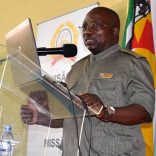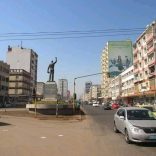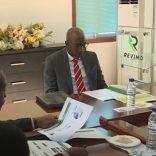Mozambique: Walking the walk on election protest day
Mozambique: Nyusi inaugurates private university

Photo: O País
Mozambican President Filipe Nyusi on Monday, in the district of Katembe in Maputo city, inaugurated Aquila University (UNAQ), which is a private higher education institution.
Speaking at the inauguration ceremony, Nyusi stated that public and private higher education institutions should focus on promoting knowledge, science, and technological innovation. He stressed that the country in particular values knowledge and science at the service of development.
The President stated, “We welcome the vision of this university to promote high-level qualifications, the creation, critical analysis, transmission and diffusion of a culture of knowledge of science and technology, through the articulation of research, teaching, and experimental development, and the provision of community services”.
Nyusi promised that his government will always support private initiatives in higher education as long as they bring added value to the country. He said that he wants private higher education institutions to be in the vanguard of meeting the quality indicators defined by the national system of evaluation, accreditation and quality assurance in higher education as managed by the National Council on Quality Assurance in Higher Education.
He Nyusi urged the ministerial department that oversees higher education to promote a comprehensive review and update of the legislative package to adapt it to the current pedagogical, scientific, technological, and market economy needs nationally, regionally, and internationally. In particular, “they must promote and raise the quality of the teaching staff, and reduce geographical and gender disparities”.
The President stressed the need for monitoring the process to balance the availability of courses, and to ensure that graduates can meet the needs of the labour market. He noted that this will require effective inspection and monitoring of higher education institutions and guaranteed access to the internet and other electronic platforms to support the teaching and learning process, research, and distance learning.
For the President “it is important that the public and private higher education institutions ensure the preparation and implementation of the teacher training plan, increase the number of full-time teachers, and improve their infrastructures”.
Mozambique has 56 higher education institutions, of which 22 are public and 34 private. These have 14,418 teachers and 239,602 students of whom 46 per cent are women.
UNAQ will teach undergraduate courses including agricultural engineering, nursing, law, and accounting as well as masters and doctoral degrees.












Leave a Reply
Be the First to Comment!
You must be logged in to post a comment.
You must be logged in to post a comment.